- Home
- Greg Keyes
The Reign of the Departed
The Reign of the Departed Read online
PRAISE FOR GREG KEYES
THE BRIAR KING
“A wonderful tale . . . It crackles with suspense and excitement from start to finish.” —Terry Brooks
“The characters in The Briar King absolutely brim with life . . . Keyes hooked me from the first page and I’ll now be eagerly anticipating sitting down with each future volume of The Kingdoms of Thorn and Bone series.”
—Charles de Lint
“A thrill ride to the end, with plenty of treachery, revelation, and even a few bombshell surprises.”
—Monroe News-Star (LA)
THE AGE OF UNREASON
“Features the classic elements of science fiction: high-tech gadgetry, world-threatening superpower conflict, a quest to save the world, and a teen hero who’s smarter than most of the adults . . . Powerful.” — USA Today
“Seems likely to establish Keyes as one of the more significant and original new fantasy writers to appear in recent years.”
— Science Fiction Chronicle
THE WATERBORN
“A satisfyingly robust, impressive debut that offers some genuine surprises.”
—Publishers Weekly
ALSO BY GREG KEYES
Chosen of the Changeling
The Waterborn
The Blackgod
The Hounds of Ash: and Other Tales of Fool Wolf
The Age of Unreason
Newton’s Cannon
A Calculus of Angels
Empire of Unreason
The Shadows of God
The Kingdoms of Thorn and Bone
The Briar King
The Charnel Prince
The Blood Knight
The Born Queen
Footsteps in the Sky
Babylon 5: The Psi Corps Trilogy
Dark Genesis: The Birth of the Psi Corps
Deadly Relations: Bester Ascendent
Final Reckoning: The Fate of Bester
Star Wars: The New Jedi Order
Edge of Victory I: Conquest
Edge of Victory II: Rebirth
The Final Prophecy
The Elder Scrolls
The Infernal City
Lord of Souls
Dawn of the Planet of the Apes: Firestorm
War for the Planet of the Apes: Revelations
XCOM 2: Resurrection
Independence Day: Crucible
Pacific Rim Uprising: Ascension
Interstellar
Copyright © 2018 by Greg Keyes
All Rights Reserved. No part of this book may be reproduced in any manner without the express written consent of the publisher, except in the case of brief excerpts in critical reviews or articles. All inquiries should be addressed to Start Publishing LLC, 101 Hudson Street, 37th Floor, Suite 3705, Jersey City, NJ 07302.
Night Shade Books is an imprint of Sttart Publishing LLC.
Visit our website at www.nightshadebooks.com.
10 9 8 7 6 5 4 3 2 1
Library of Congress Cataloging-in-Publication Data
Names: Keyes, J. Gregory, 1963- author.
Title: The reign of the departed / by Greg Keyes.
Description: New York : Night Shade Books, [2018] | Series: The high and faraway ; Book one
Identifiers: LCCN 2017031334 | ISBN 9781597809375 (pbk. : alk. paper) Subjects: | GSAFD: Fantasy fiction.
Classification: LCC PS3561.E79 R45 2018 | DDC 813/.54--dc23 LC record available at https://lccn.loc.gov/2017031334
eISBN: 978-1-59780-627-5
Cover illustration by Micah Epstein
Cover design by Claudia Noble
Printed in the United States of America
To Kenneth Hoffman Carleton
PROLOQUE
Aster shrieked as a huge wave struck the silver ship and hurled its prow toward the bleak sky, but her voice was lost in the howling wind and steady drum of thunder. Her feet slipped from under her, and only her grip on the handrail saved her from being flung over the side. The wave roared under them, and then her stomach went all strange for a moment and her body seemed to weigh nothing at all.
Then they slammed back into the sea, and the rain-slicked deck was beneath her again.
She saw him now, standing on the bow of the carrack, his red hair streaming like fire in the wind. He spoke words louder than the thunder. Dark things beat at him from out of the storm; sometimes they seemed to have faces.
He had fought them before—in the glass city, in a forest of singing trees, on another sea, on another boat. And he had battled other things more terrible still. She didn’t remember all of the nine years of her life, but as far back as her memory went, he had been fighting something.
But now he seemed to be losing.
She struggled toward him, gripping the rail, trying to recall a Recondite Utterance, but all she could remember was a Whimsy for opening flowers.
He stumbled to one knee and a hundred smoky fingers seized at him. From the clouds, gigantic wings appeared, supporting the coiling, sinuous body of a serpent that dwarfed their little ship. The monster gaped a mouth large enough to swallow a man whole.
“Daddy!” Aster screamed, running toward him.
The next wave struck, and the ship spun half around, and once again the few pounds her body possessed were taken from her.
But this time she wasn’t holding on to anything.
She saw her father’s face; it seemed far away. The silver ship, too, fell away—and then the sea swallowed her. Water pressed at her lips and nostrils, trying to fill her up. She flailed her arms and legs, but she didn’t know which way the surface was.
Something gripped at her ankle and pulled. She turned, and in the murky light she saw the ill-shaped form of the thing and knew it wasn’t her father. She fought, but it towed her with awful strength. She needed air. Her panic was a cloud of bees in her.
Suddenly she knew the surface because it blazed red-gold, like fire seen through beveled glass. The creature clutching her was a black shadow against it, and for a moment, all seemed still and quiet.
Then the monster dragged her out of the water. It had something like a face, and it was grinning. Aster’s greedy lungs sucked in air that stank of sulfur and soot.
Her captor stopped grinning when it saw her father, a yard away, still on the prow of the silver ship, no longer kneeling but standing tall as a tree. His eyes blazed with familiar fury.
Her father spoke a word, and the thing split in half and each half into another. She fell again, but not far; her father seized her leg where her captor had been gripping it. As it turned into a mist of ash, he pulled her up.
The storm was swiftly receding in all directions. They were in the center of a widening circle with blue sky above. Little yellow flames danced here and there on the waves and the ship, and on the broken and blackened body of the winged snake that was slowly sinking into the sea.
Her father cradled her in his arms.
“Streya, Streya,” he murmured. He smelled of lightning and whisky.
“I told you to keep below.”
“I wanted to help, Daddy,” she said.
“I know,” he said. “But I cannot lose you, do you understand? If I lose you nothing I have done will be worth it. So when I tell you to keep below, keep below.”
“Yes Daddy.” She smiled a little. “You beat them. I was afraid you were going to lose.”
“I had hoped to win without the use of such an Utterance,” he said. “I had hoped to escape their attention, to put them off the trail. This—this will be noticed.”
“I’m sorry Daddy.”
“It’s not your fault, Streya,” he said. “Come below. I need a
drink.”
He was shaking a little; she could feel it. Wh
enever he did something really big, he shook.
They went below, and she fetched him his bottle. He drank straight from it.
“It’s no matter,” he said. “The curse is following close behind us. All we need to do is outrun it. I know a place where you will be safe.”
“But you’ll be with me, Daddy, right?” she said. “You’ll be there too.”
“Of course I will, Streya,” he said.
He looked very tired now, and sad. She knew that could last for days.
“I wish I knew more,” she said. “A Whimsy to lift your spirits. A Recondite Utterance to slay your enemies.”
He took another long drink.
“Where we go, Streya, I pray you have no need of such knowledge. And as for my spirits, I will not be satisfied until you are safe.”
She nodded.
“Do you miss it Daddy?” she said, after a moment. “Do you miss her?”
He looked away from her.
“Yes,” he said. “And yes.” He took another drink.
“Do you remember that place?” he asked her.
“I think so,” she said. “There was a garden, and peach trees, and my room was blue, with stars on the ceiling.”
“Yes, that’s right,” he said. “And do you remember her?”
She shook her head. “I try,” she said. “I only remember her voice, singing.”
“She had a beautiful voice,” he said. “She was beautiful, just as you are.”
Aster nodded. He had told her that many times.
“Can we ever go back?” she asked.
He was silent for a long time.
“No,” he said. “No, Streya, we can never go back.”
She felt the emptiness in him when he said that. And it showed in his eyes.
“It’s just you and me then,” she said.
“Just you and me,” he echoed.
“That’s all I need, Daddy. That’s all we need.”
He tried to smile, then nodded, and the little silver ship sailed on.
PART ONE
WAKING
ONE
MOSTLY DEAD
The way he remembered it, Errol hadn’t set out to kill himself. That had sort of evolved after he found his father’s things, things his mother had hidden away in the attic. One of them was a bottle of scotch, which he started in on immediately. When he was a little drunk he found the painkillers. Even then, he only meant to take one or two, to feel better and forget everything for a little while. But after a few of the pills, forgetting forever sounded pretty good, and he took the rest of them. He thought he would fall asleep and just fade away, become a hole the universe would quickly fill.
That’s not how it went. His body fought death and he got sick, very sick, and then he became scared and finally utterly terrified. He tried to dial nine-one-one—only by then, it was too late. The numbers were blurred and unfocused, his body was wracked with spasms, and he couldn’t get his fingers to cooperate. The numbers faded entirely, and all he could see was the glow of the phone, and soon that darkened, too.
So he didn’t exactly remember dying. But he did remember coming back.
The first thing he knew he was lying in his great-grandmother’s feather bed with the comforter pulled over his head. He knew that from the faint smell of cedar, the call of the rooster outside, the chirping of birds as morning came to the woods and pasture that surrounded her house. She would be in the kitchen already, making biscuits, and soon he would get up, eat the biscuits with butter and lots of jam and spend the day exploring the forested hills that went off what seemed like forever in all directions.
He had spent a couple of summers here with Granny, passing his days in solitude and in her comforting, undemanding presence. Those days were the only times of pure contentment he had ever known in his seventeen years.
He heard her calling him to breakfast, but he stayed in bed. He would pretend to be asleep until she came to wake him with a light, dry kiss on his cheek.
She called again, but this time something didn’t sound right about her voice. It had a strange edge to it.
The next time she spoke he was sure it wasn’t her.
He tugged the covers tighter over his head, remembering the scotch and the pills and that Granny had been dead for years. Something grabbed the covers and yanked them back, calling his name again, and this time it didn’t even sound human and he screamed because there was nothing else to do.
He had been screaming for a while before he realized he hadn’t yet drawn a single breath—and that he still didn’t need one. He also became aware that he was sitting up. His panic seemed to have washed every emotion out of him, and he felt oddly calm. The darkness was gradually lightening as well, and he began to make out that he was in a room he didn’t know, with dark blue walls and lots of antique furniture. And books, books everywhere.
“What’s your name?” a familiar voice asked.
“Errol,” he said, without thinking. “Errol Greyson.” The voice was behind him. He tried to turn, but the high back of the chair blocked his vision, and he couldn’t stand up—he seemed to be strapped into the thing. But he knew who it was, by her unmistakable and singular accent.
“Aster?”
“Yes,” she said. “That’s me. So you know who I am. That’s good. Now, try not to freak out.”
“I’m pretty freaked out, Aster,” he said, as she stepped into view.
“I’ve put a calming charm on you,” she said.
Aster Kostyena had fine, flyaway hair which aspired to be red, but wasn’t quite. Her head was large and sort of onion-shaped. She had big, green eyes and long thin limbs and she had always reminded him a little of the Christmas elves in stop-motion TV specials.
She had first appeared at Sowashee Elementary in fourth grade; rumor had it that her father had been a mafia boss in Russia and was hiding out in America because things had gone badly for him over there. Errol had had sort of a crush on her back then, because of her accent and because she was so different from anyone he knew. Of course he had never told anyone that, especially not her. They had been friends for a while, but by seventh grade they hardly talked to each other anymore. Even now he had the stray thought about her—at least before his thing with Lisa. But his friends all thought she was strange and didn’t think she was all that pretty, so there was no way he would have ever asked her out. She would have told him no anyway, most likely, just another rejection to add to his résumé.
“Calming charm,” he repeated.
“Yeah,” she said. “Kind of like magical valium.”
Which just sounded crazy. Like the whole situation.
“And you’ve tied me to a chair,” he said, glancing down.
Looking down was a mistake, but now he believed her about the calming charm. Otherwise he would be screaming again instead of merely being very, very alarmed.
Up until then he had been piecing together a scenario where Aster had somehow come into his house and found him passed out. For whatever reason, she had kidnapped him, tied him up . . .
But no.
What looked like his arms, legs and chest—what felt like them—were not. What he saw instead were limbs of carved wood, held together by bolts and wire. The hands were perhaps strangest, both delicate and strong-looking; some fingers were black, some white, as if they had been made from piano keys. The torso was built of slats, put together like a barrel with steel bands.
He flexed his fingers. The digits moved.
And he was tied up, with several coils of heavy rope.
“This isn’t real,” he said. “I’m dreaming.”
“You can believe that if it helps,” Aster said.
He felt a little panic pierce through the unnatural calm. “Am I—am I dead?” He looked up at her. “Is this Hell? Are you really Aster?”
She knelt down so their faces were level. She was wearing a denim jumper over black pants, an outfit she’d worn at least once a week since tenth grade.
She
looked him directly in the eyes.
“This is not Hell, Errol—this is my house. You pass it every day on your way to school. And you aren’t dead. You are only mostly dead.”
That was enough—suddenly he couldn’t take it anymore. Errol started jerking, trying to wriggle out of the ropes.
“Get me out of this,” he demanded.
“Don’t do that,” Aster said, but he wasn’t listening to her anymore. Whatever this was—hell, a bad dream, a drugged-out hallucination—he was done with it.
The ropes were strong but, he realized, so was he. The chair began to splinter, and that loosened his bonds, and then the chair slammed to the floor. He got one arm out, and then the other.
“Stop it, Errol,” Aster said.
He didn’t, of course.
“Svapdi,” Aster shouted, and everything went black.
Thank God, was his last thought.
The next thing Errol knew, he was flat on his back. The broken chair was all around him, and Aster stood a few feet away, looking a little vexed.
And he was still a giant puppet. Apparently.
“That was a perfectly good chair,” Aster said. “I have to say . . .”
She stopped, closed her eyes, and drew a long breath.
“Look,” she said, “I’m sorry I tied you up. But I couldn’t be sure I was going to get—you. I don’t summon up spirits every day, you know. Or ever before, really. If I had made a mistake, there’s no telling what might have showed up—a dhves or a leme or worse. Now I know it’s you, so I won’t tie you up again. But what you need to know—what you need to understand before we go any further—is that I can stop you with a word, anytime, like I did just now. I can send you right back where you came from.”
“Back where?” Errol yelped, still on his back. “Where did I come from? What’s happening to me?”
“You can get up,” Aster said. “I have something to show you. It might help.”
Errol did get up, albeit clumsily. The wooden body was a little bigger than his real one, and it didn’t move exactly like a human body. That sent a chill through him because it made everything seem somehow more real. Details. In dreams things just sort of were. And they weren’t usually this consistent.

 Godzilla
Godzilla Godzilla vs. Kong
Godzilla vs. Kong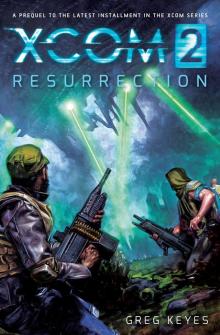 XCOM 2- Resurrection
XCOM 2- Resurrection Independence Day: Crucible (The Official Prequel)
Independence Day: Crucible (The Official Prequel)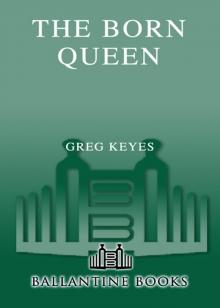 The Born Queen
The Born Queen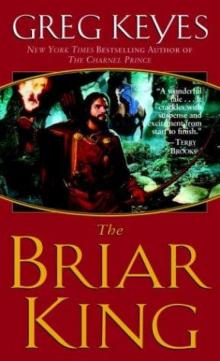 The Briar King
The Briar King Star Wars The New Jedi Order - Dark Journey - Book 10
Star Wars The New Jedi Order - Dark Journey - Book 10 Star Wars: New Jedi Order Book 8b: Emissary of the Void
Star Wars: New Jedi Order Book 8b: Emissary of the Void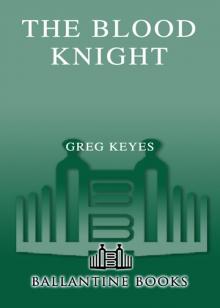 The Blood Knight
The Blood Knight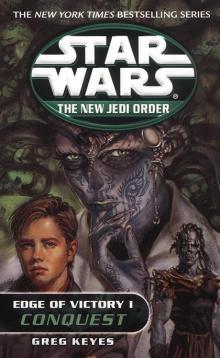 Star Wars - Edge of Victory - Book 1: Conquest
Star Wars - Edge of Victory - Book 1: Conquest Edge of Victory 2 Rebirth
Edge of Victory 2 Rebirth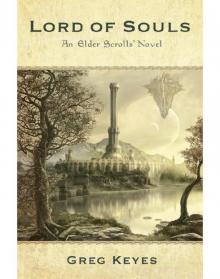 Lord of Souls: An Elder Scrolls Novel
Lord of Souls: An Elder Scrolls Novel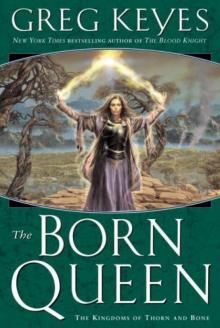 The Born Queen tkotab-4
The Born Queen tkotab-4 Rebirth: Edge of Victory II
Rebirth: Edge of Victory II Conquest: Edge of Victory I
Conquest: Edge of Victory I Emissary of the Void
Emissary of the Void The Blackgod
The Blackgod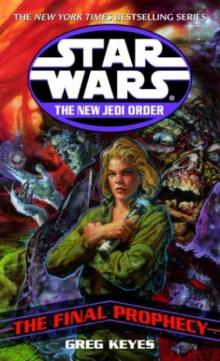 Star Wars The New Jedi Order - The Final Prophecy - Book 19
Star Wars The New Jedi Order - The Final Prophecy - Book 19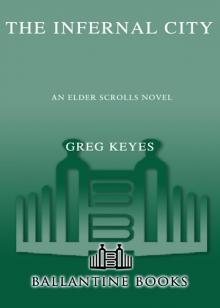 The Infernal City
The Infernal City The Charnel Prince
The Charnel Prince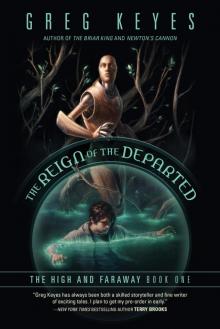 The Reign of the Departed
The Reign of the Departed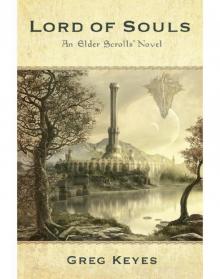 Lord of Souls es-2
Lord of Souls es-2 Chosen of the Changeling
Chosen of the Changeling Dawn of the Planet of the Apes
Dawn of the Planet of the Apes Footsteps in the Sky
Footsteps in the Sky PACIFIC RIM UPRISING ASCENSION
PACIFIC RIM UPRISING ASCENSION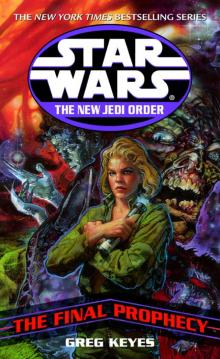 The Final Prophecy: Edge of Victory III
The Final Prophecy: Edge of Victory III